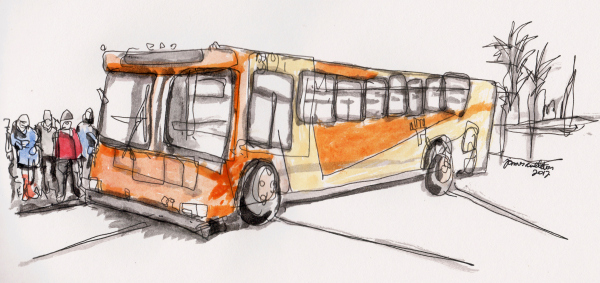The push to get Winnipeg university students access to a universal bus pass, or U-Pass, gained an important endorsement from Mayor Sam Katz in December.
After an executive policy committee meeting on Dec. 13, Katz told reporters that council would work with student unions from both the universities of Manitoba and Winnipeg to put forward a January motion that would make the U-Pass a reality.
This comes on the heels of city hall’s announcement that Winnipeg’s rapid transit corridor will soon be expanded. Following the expansion, the University of Manitoba’s Fort Garry campus will connect to the northern part of the system, which currently ends at Jubilee Ave.
In April 2013 the city council’s public works committee unanimously backed the U-Pass idea.
The U-Pass would see all undergraduate students at the U of M and U of W pay into a program that guarantees unlimited and reduced-cost access to Winnipeg Transit during the regular September to April school year.
The cost of the program is projected to be $283 per student, with city and provincial governments covering $133. Students would pay the remainder. The current cost of a student bus pass is $66.25 per month. The U-Pass cost is much lower per student because the program would combine the purchasing power of 34,000 undergraduates – not all of whom would be riding the bus.
The Canadian Federation of Students (CFS) also supports the U-Pass initiative. Bilan Arte, Manitoba representative of CFS, points to numerous potential benefits.
“Student ridership has increased dramatically in other cities that have similar programs, and students will often continue to use public transit after they graduate and buy a full-cost adult transit pass,” Arte said to the Manitoban.
“A major benefit of this increased ridership for Winnipeg Transit is the opportunity and the resources to expand and fully develop a modern, sustainable, and comprehensive transit system for our city.”
UMSU vice-president external Christian Pierce also foresees positive change coming from the U-Pass.
“In addition to using it to get to and from school, students could use Winnipeg Transit as they please to get to other key destinations around the city; it would also help build a true public transit culture which does not currently exist in Winnipeg,” he said.
According to Arte, even with support from CFS, the students, and student unions at both the U of M and U of W, obstacles have still arisen.
“The single largest challenge has been getting city councillors to understand the positive economic and social impact the U-Pass will have on the city [and] that any public investment received will be offset in the long-term by cost-savings in infrastructure repairs and increased transit ridership,” she explained.
Pierce and Arte both noted city councillor Jenny Gerbasi’s support of the program. Others in city council, including Dan Vandal, Brian Mayes, and Mayor Sam Katz, are now adding their weight – a signal that the initiative is gaining momentum at city hall.
Similar programs exist in many other large Canadian urban centres and have seen public transportation use increase as a result. Winnipeg Transit estimated that student use of public transportation would increase at least 20 per cent if all students were given bus passes.
Originally, the U-Pass program was projected to begin in September 2014. That date has since been changed to January 2015.
“A lot of students don’t realize that this is a long process. Once the funding is secure, Winnipeg Transit will need about a year to order more buses, hire more drivers, and increase service routes,” said Pierce.
Arte is confident that the U-Pass initiative will succeed.
“As more and more cities implement programs like these and students continue to pressure city councillors, we’re confident that the City of Winnipeg will see its advantages and follow suit.”
UMSU members voted on the issue in a November referendum last year, with 74 per cent supporting the idea of a U-Pass.



Also includes grad students at UofW because they are also part of UWSA.